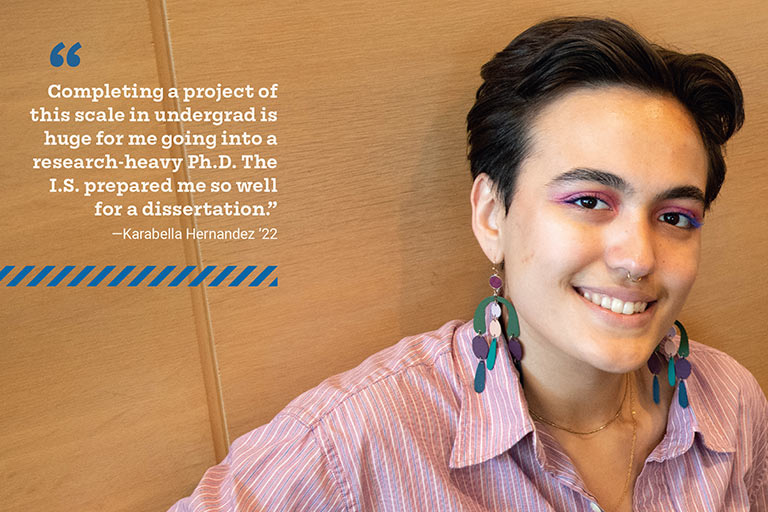Future clinical counselor gathers trauma research data from an internship at OneEighty

Article published in the Summer 2022 Wooster Magazine. Click here to view the spread.
Karabella Hernandez ’22 knew she wanted to study psychology and become a counselor. She knew The College of Wooster was the place for her after just one visit. She was even confident in assisting with faculty research as early as sophomore year.
She was more than equipped to travel the academic road ahead, but when it came time for an internship, Hernandez said she struggled with imposter syndrome—as if she was undeserving or incompetent to do the work.
Hernandez sought a position with OneEighty, Wooster’s leading mental health, addiction, and domestic violence support center, led by executive director Bobbi Douglas ’80, a graduate of Wooster’s sociology program. They hadn’t hosted undergrads before, but her interview went well, and they worked with her. She spent three weeks getting up to speed on office procedures, documentation, and even accrued enough hours of training to put toward a Chemical Dependency Counselor Assistant certification.
“This was my first time doing any sort of clinical position, and it was really important to me because it was what I wanted to do with my life,” recalled Hernandez. “I was working with all these doctoral-and-master’s-degree-level counselors who had been doing this for many years, and I was blown away by that. I had to get over that imposter syndrome and remind myself I deserved to be there.”
In the weeks that followed, Hernandez worked in the outpatient department shadowing counselors in their client sessions, compiling and distributing resources, and doing other work that ultimately helped her confirm her future career path.
As part of the internship, she applied for an APEX Fellowship that provided funding for her otherwise unpaid work. The fellowship required her to document the experience via weekly journal entries. “It would have been a huge burden to not get paid,” said Hernandez. “I applied for the fellowship because it was important to allow me to do this work, and it gave me wonderful opportunities for reflection.”
At the end of the 10-week summer 2021 internship, OneEighty invited her to stay on staff through the academic year co-facilitating a houseless substance abuse group and a dialectical behavior therapy group, providing individual substance use counseling and assessments, and helping with some administrative tasks.
When it came time for her senior Independent Study, Hernandez was influenced by personal experiences to look into how childhood trauma can affect people into adulthood. “I knew from the get-go I wanted to sample OneEighty clients because they could be a rich source of information,” said Hernandez. “Most I.S. research is done through college students where peers complete a survey. It’s good, but I wanted a diversity of ages and life experiences in my sample.”
Hernandez used a well-established measure of childhood trauma, called the Adverse Childhood Experiences Questionnaire, along with open-ended questions to collect qualitative data around psychological wellbeing (personal fulfillment, self-esteem, mental health, relationships with others, etc.). She was surprised to find no significant associations between the childhood trauma measure and other quantitative variables even though the qualitative responses said the exact opposite.
“This blew my mind! But I did find that all the other variables had tons of significant relationships,” recalled Hernandez. “Self-esteem significantly predicted well-being in adulthood while an insecure attachment style showed lower well-being. The research makes it clear that self-esteem is very important, and it provides a lot of implications for intervention, treatment, and practice.”
Amber Garcia, professor of psychology, mentored Hernandez during her I.S. “Trauma-informed research and therapy is very popular in psychology right now, no doubt influenced by the pandemic,” said Garcia. “Karabella is an outstanding student researcher who examined a topic she was intrinsically motivated to study. Using a community sample for a two-semester undergraduate thesis is quite an accomplishment.”
The mentored pair has worked together for a few years on earlier research projects, including one where Hernandez was the second author on a Garcia manuscript that’s up for review with the Journal of Family Issues.
“I was able to submit my I.S. early because Dr. Garcia set up a seamless process for me,” raved Hernandez. “Completing a project of this scale in undergrad is huge for me going into a research-heavy Ph.D. The I.S. prepared me so well for a dissertation.” Hernandez will attend Purdue University for her Ph.D. in counseling psychology starting this fall.
OneEighty Resources
For those encountering a substance use crisis, please call OneEighty’s Substance Use Crisis hotline, available 24 hours per day, 365 days per year, at 330-466-0678. For other resources, click the links below:
